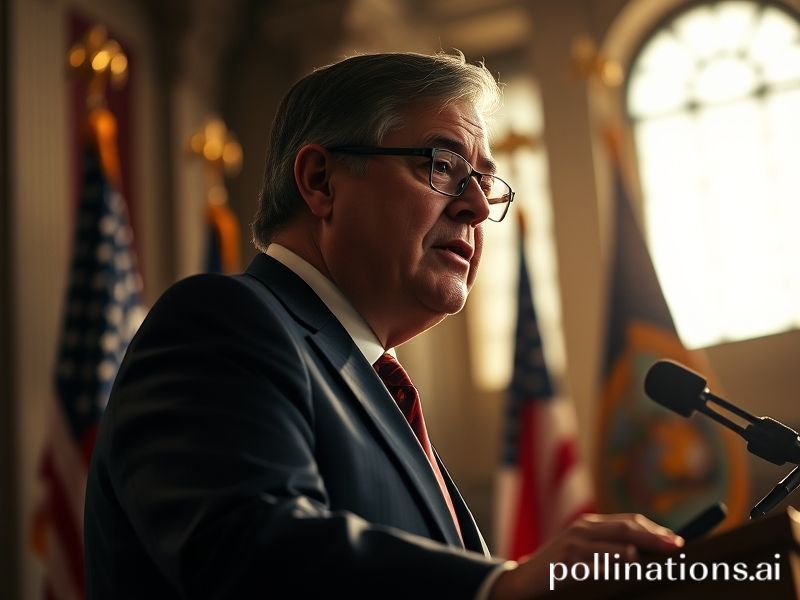Tim Walz: The Minnesota Nice Experiment the World is Secretly Betting On
Tim Walz and the Global Giggle Fit
By Our Man in the Departures Lounge, somewhere over the Atlantic
If you mention “Tim Walz” in a Brussels café, the waiter will nod politely while mentally calculating the tip. Say it in a Nairobi newsroom and an editor will ask whether that’s the new strain of avian flu. But whisper it in the right bar in Taipei or Tegucigalpa and you’ll discover that the governor of Minnesota—yes, the one with the lakes, the mosquitoes, and an inexplicable fondness for hot-dish—has quietly become a litmus test for how the rest of the planet gauges American sanity.
To understand why a man whose signature legislative win involves free school lunches now matters from Montevideo to Mumbai, you need to appreciate the international spectator sport known as “Watching America Pretend to Be Normal Again.” After four years of reality-TV diplomacy and a sequel currently in production, global audiences crave a character who can convincingly wear both a Carhartt jacket and the expression of someone who has read an entire briefing paper. Walz’s biography—National Guard command, high-school football coach, China-teaching stint, and a legislature that once shut down because everyone was too Minnesotan to argue—offers a soothing narrative arc: the competent adult who can still pronounce “Uighur” without starting a trade war.
Abroad, competence is the new charisma. France has Macron’s Jupiter complex, India has Modi’s holographic omnipresence, and Britain has, well, whatever Rishi Sunak is. Against this backdrop, Walz’s everyman affect reads like a diplomatic masterstroke. When he signed a law guaranteeing menstrual products in schools, European gender-equality ministers sighed with envy; when he legalized recreational cannabis, Latin American diplomats reached for the popcorn, muttering, “So you can just…do that without a coup?” The message, received in 24 languages and several dialects of sarcasm, is that America might still be capable of incremental sanity.
Of course, the world’s affection is conditional. Foreign ministries track his approval ratings the way traders watch pork-belly futures. A Walz stumble—say, a deer-in-headlights moment over Gaza or a cringe-worthy attempt at pidgin Spanish—would ripple through capitals faster than you can say “soft power.” Conversely, every successful winter road-salt budget negotiation is silently cheered in places that still measure snowfall in meters. The unspoken hope is that if Walz can keep Minnesota from seceding into Canada out of sheer embarrassment, maybe the federal experiment still has legs.
Yet the darker joke, appreciated from Kyiv to Canberra, is that Walz’s global relevance rests on the same American pathology he’s supposed to cure: the tendency to project every provincial drama onto the world stage. The man hasn’t even declared for higher office, yet think-tankers in Seoul are gaming out how his prairie populism would play against Xi Jinping. Meanwhile, African Union analysts wonder whether his China years make him a pragmatist or just another midwesterner who came back with a tea set and delusions of bilingualism. The planet, in short, is outsourcing its anxiety about America to a guy whose main foreign-policy credential is once getting lost in the Beijing subway.
And so we arrive at the gallows punch line: Tim Walz is globally significant precisely because he appears globally insignificant. In an era when every head of state tweets like a drunk teenager, the mere absence of pyrotechnics is interpreted as strategy. Foreign correspondents file 800-word dispatches about his fishing-license policy as though deciphering the Dead Sea Scrolls. The irony, delicious enough to spread on lefse, is that a politician who prides himself on “getting stuff done” has become an international Rorschach test: the world sees in Walz whatever it needs to believe about America—stability, decency, or at least a pause in the clown car.
Should he stumble upward onto a national ticket, champagne corks will pop from Ottawa to Oslo. Should he stay put, the same corks will merely pop later, accompanied by the gentle shrug that is the international community’s version of a standing ovation. Either way, Governor Walz has already achieved what most diplomats only dream of: convincing the planet that Minnesota nice might just be a foreign policy. And if that doesn’t work, there’s always hot-dish diplomacy—casseroles as soft power. Stranger things have happened; most of them, fittingly, in America.







